The Republic of Ireland have been blessed with some terrific footballers over the decades, many of whom have earned iconic status with their heroics at World Cups and European Championships.
But what of the talented players who never got the chance to grace a major finals, through ill luck, injury, or unfortunate timing?
We're asking you to help us choose a Republic of Ireland XI made up of the best players we've had who never played at a major international tournament.
We've put together the shortlist of goalkeepers, full-backs and wingers, but today we look at the men in the middle of the park. If you think we have omitted anyone, please contact us at teamselection@rte.ie.
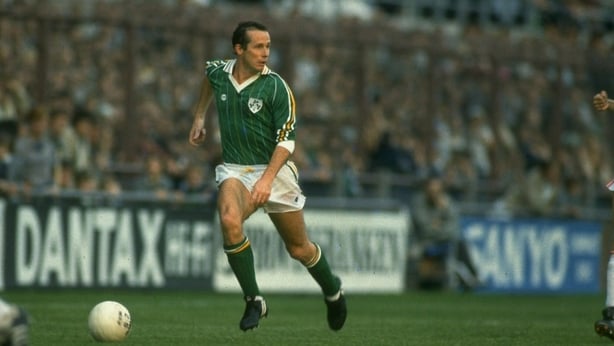
Jack Charlton did incredible things with the Republic of Ireland team, but his failure to fully utilise the talents of Liam Brady will always be hard to fathom.
The Dubliner was one of the finest midfielders in Europe at his peak. He was the focal point for Arsenal through the second part of the 70s, heading for Serie A in 1980 where he shone in a brilliant Juventus team that won two Scudettos before moving on to Inter Milan, Sampdoria and Ascoli.
Charlton never seemed comfortable with a maverick like Brady a the heart of his team, though it was bad luck and a moment of indiscipline that cost the St Kevin's Boys graduate involvement at Euro 88.
He'd played through the qualification campaign but picked up a two-game ban for kicking out at a Bulgarian player in the last match of the group.
Brady, by then plying his trade at West Ham, suffered a bad knee injury just afterwards which was the final nail in the coffin in terms of him featuring at the finals.
Ireland's impressive showing in Germany seemed to strengthen Charlton's belief that he didn't need Brady in his team at all and by the time Italia 90 rolled around, he was peripheral. In 1989, Brady, then 33, was hooked just 35 minutes into a Lansdowne Road friendly against West Germany. A few hours after the game, he announced his international retirement.
Charlton was unrepentant. "I left (him on) longer than I should have done really," he said afterwards. "Liam was struggling to get through the game at the pace I wanted him to get through the game. After half an hour I thought, 'enough is enough'."
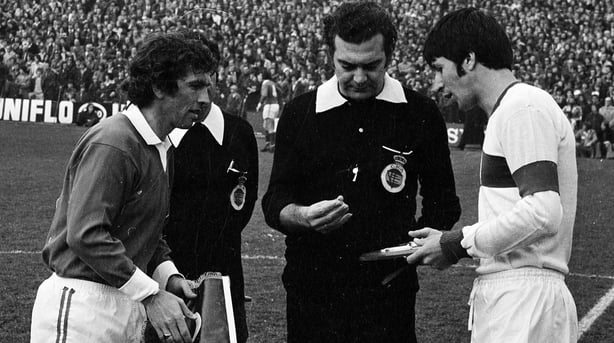
John Giles strongly criticised Charlton over his treatment of Brady. He played with, and managed, his fellow Dubliner and was a man well qualified to recognised a serious midfield talent. Giles himself was one of the best.
He spent six years at Manchester United under the guidance of Matt Busby but Giles will always be most associated with Leeds United, where his career took off following a move to Yorkshire in 1963.
Giles was bitter about the way things ended at Old Trafford and vowed to "haunt" Busby, who'd gone cold on the Irishman's potential. Tough, creative, and blessed with a phenomenal range of passing, Giles was at the heart of a golden era for Leeds.
He made his Ireland debut against Sweden in 1950, scoring in a 3-2 friendly win at Dalymount Park. By the time he was named player-manager in '73, Giles was the his country's best and best-known player.
He nurtured a talented bunch of players through two qualification campaigns, coming up just short in the mission to make the '78 World Cup which was defined by controversial refereeing decision in the away loss to France and - infamously - against Bulgaria in Sofia, a bad-tempered match that ended in two Irishmen being sent off.
Giles had a goal chalked off after a highly questionable offside call that evening.
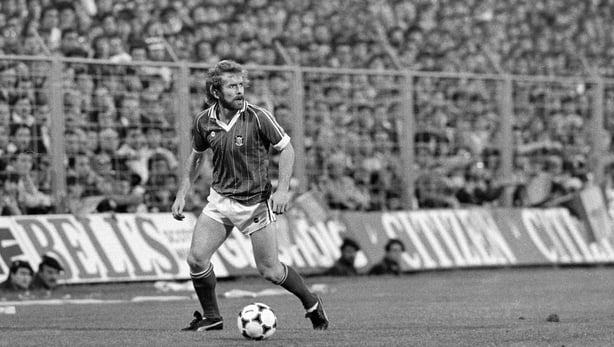
He gave Tony Grealish his first senior Republic of Ireland cap in 1976 and then signed him for West Brom nine years later. He was a player, Giles said after Grealish's passing in 2013, that "gave you absolutely everything".
Born in London to a Galway father and a Limerick mother, Grealish endeared himself to Irish fans with lung-busting performances and unflinching commitment.
Grealish played for Luton Town, Brighton and Manchester City but he always seemed to raise his game to another level when he represented Ireland. His final international game was the infamous 4-1 defeat to Denmark at Lansdowne Road that led to Eoin Hand's sacking and the arrival of Jack Charlton.
He won 45 caps, captaining the country on 17 occasions.
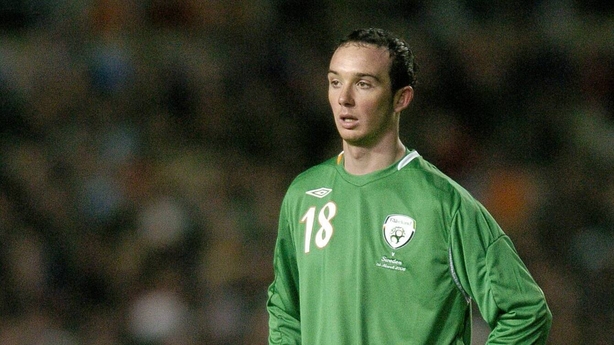
Stephen Ireland will, unfortunately, forever have an asterisk beside his international career. At the tail end of the failed Euro 2008 qualification campaign, in between clashes with Slovakia and the Czech Republic, Ireland had claimed his maternal grandmother had passed away.
When it transpired that was not the case, he claimed it was his granny on his father's side. Eventually he came clean and admitted the it had all been a charade and that he had wanted to return to be with his girlfriend, who had had a miscarriage.
The whole saga led to a self-imposed exile and the unfortunate decline of a hugely promising international career.
Ireland had been a rare bright spark in the Steve Staunton era. A clever, silky player who could plunder goals from midfield, he should have been a talisman for years.
Instead Ireland goes down as an unfulfilled talent.
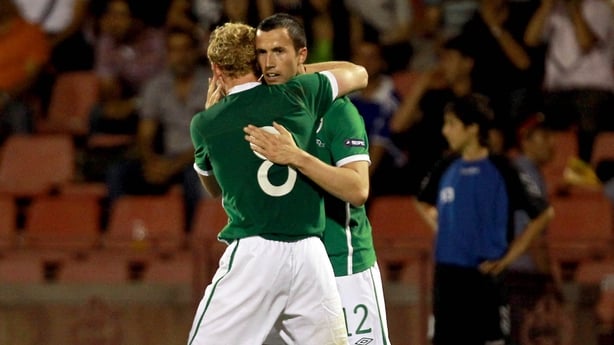
Keith Fahey won 16 caps, which is a low tally for a man of his capabilities.
He was very unfortunate not to travel to Euro 2012, being replaced by Paul Green weeks before the tournament after suffering a groin injury.
He'd helped Ireland get to the finals in Poland and Ukraine by sweeping home the winner in a qualifier in Armenia.
In 2009, after a couple of blistering campaigns with St Pat's, Fahey moved to Birmingham City, where he would win the English League Cup in 2011, establishing himself as a Premier League midfielder under Alex McLeish.
Trap tended not to trust players in a similar mould to Fahey - Andy Reid, Wes Hoolahan for instance - but he liked the Dubliner, who returned to the Saints in 2013 and led them to an FAI Cup triumph. An extremely intelligent and adaptable footballer.
Con Martin is the only player nominated for this Alternative Ireland XI who could probably have contested for a place in every single position.
The Rush man played for Drumcondra, Glentoran, Leeds United, Aston Villa and Waterford throughout the 1940s and '50s. He also played for both the Ireland teams under the FAI and IFA administration, winning 30 caps for the Republic of Ireland and six for Northern Ireland.
Martin was best known as a centre-half, but he actually made his international debut for the Republic of Ireland as a goalkeeper and played close to a complete season in goal for Aston Villa.
He lined up in every position on the field so we feel he'd be pretty comfortable sitting deep in the middle for our team.
Martin's most memorable moment in green came when he scored a penalty in a 2-0 win against England at Goodison Park in September 1949. It was England's first home defeat to a non-UK side.
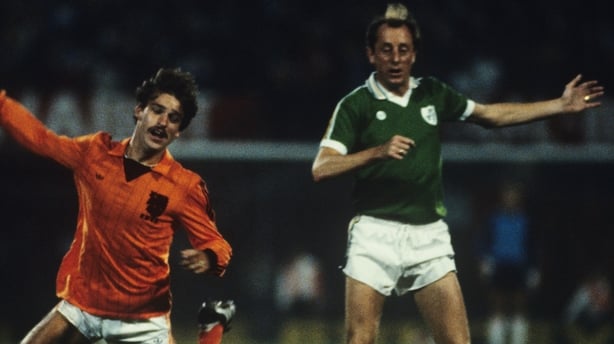
Con's son Mick Martin won 51 caps for Ireland, making his debut when at Bohs in 1971. Two years later, Manchester United came calling. He went to Old Trafford around the same time as Gerry Daly but these were tough times for the English giants, who suffered a shock relegation in Martin's time there.
Giles brought his compatriot to West Brom in 1975 and he eventually headed to Newcastle United, where he was made captain and clocked up nearly 150 appearances.
Martin was banned from international football for nearly two years for his part in the Bulgaria brawl, a punishment which certainly cost him more caps, but he was always considered a very capable and effective midfield deputy.
His final game for the Boys in Green was against Spain in Zaragoza in 1983. The hosts won 2-0.
The only and only Paddy Coad #coadscolts pic.twitter.com/ksV8bpMjkP
— Shamrock Rovers FC ☘️ (@ShamrockRovers) February 20, 2017
Paddy Coad is regarded as one of, if not the best, Shamrock Rovers players of all time.
The Waterford man won just 11 caps for Ireland but he still managed to make a considerable impression at international level. With his club, he achieved legendary status.
Coad played as a wing-forward but could take up a creative midfielder role in this team from where he could put his masterful playmaking talents to best use.
A maker and taker of goals, he hit the net 121 times in a remarkable League of Ireland career, tagging on 41 more in the FAI Cup.
As Hoops player-manager, he coaxed a huge haul of trophies from a young, exciting team that were nicknamed 'Coad's Colts'.
He played for Rovers against Manchester United in the 1957 European Cup tie when he was aged 37, having pulled on an Ireland shirt for the last time five years earlier, against Spain in Madrid.
VOTE NOW CLOSED
Selections: John Giles and Liam Brady


